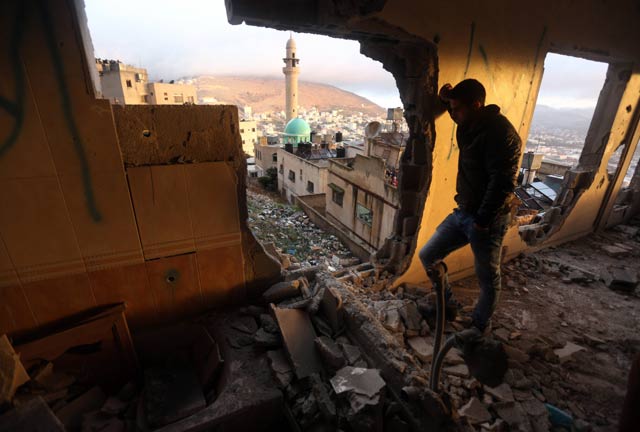
"Some (Israeli) customers still talk to us normally, but others look at us strangely and think that we're all terrorists," said the 38-year-old Palestinian.
Clashes as Israel demolishes Palestinian attacker's home
"They tell us: 'Surely it's your brother or your cousin who is attacking us.'"
 PHOTO: AFP
PHOTO: AFPGush Etzion Junction, located near a large block of Israeli settlements and Palestinian villages in the occupied West Bank, has been the site of around 10 attacks over the past several weeks.
Situated along a major highway between Jerusalem and Hebron, cities sacred to both Jews and Muslims, Israeli settlers and Palestinians have long stopped there to fill up their cars or buy groceries.
Israel to coordinate with Google, YouTube to censor Palestinian conflict videos
Workers at the junction's businesses are also both Israelis and Palestinians, and residents of nearby settlements often gather there to hitch rides.
 PHOTO: AFP
PHOTO: AFPBut a series of recent knife, car-ramming and gun attacks by Palestinians has turned it into a heavily guarded location where fear now reigns.
The anti-Israeli attacks have been part of a wave of violence since the start of October.
Violence in Israel, the West Bank and the Gaza Strip has since killed more than 120 people, including 103 Palestinians and 17 Israelis.
Palestinian killed by Israel army fire in West Bank: ministry
At the junction itself, two Israelis, a Jewish American and a Palestinian have died. Seven Palestinian assailants have also been shot dead by Israeli forces at the site.
Heavily armed and masked Israeli soldiers now stand guard among concrete blocks, and Palestinians, whether they be in cars or on foot, are searched.
Illustrating how the junction has become a flashpoint, Israeli Prime Minister Benjamin Netanyahu toured the area on November 23, the day after a 21-year old Israeli woman was stabbed to death at the site, and pledged increased security measures.
 PHOTO: AFP
PHOTO: AFPThroughout the West Bank, some 400,000 Israeli settlers live among 2.5 million Palestinians in a near constant state of tension.
The Gush Etzion settlement bloc as well as the nearby settlement towns of Efrat and Beitar Ilit are home to some 92,000 Israelis. An estimated 2,000 Palestinians work in those areas.
Israel razes home of man allegedly behind settler killing: army
The Rami Levy discount supermarket at the junction says 40 per cent of its employees are Palestinian and counts many Palestinians among its customers.
But on a recent day it was nearly empty, like other businesses in the area. Fear and checkpoints seem to have kept many away.
Rivka Pavie, an Israeli woman who lives in a nearby settlement, said as she waited at a bus stop: "We cannot imagine avoiding this junction. We are not going to allow ourselves to be terrorised."
However, she also acknowledged that she no longer brings her children along.
Israel angered by EU decision to label settlement goods
A Palestinian supermarket worker said he puts aside his fear to show up for his job and "feed his family".
"Customers see that we are employees and respect us," said the Palestinian man, who declined to be identified.
"The real problem is going to and from work. Someone can single us out (as an attacker). One shot and we can disappear in a snap."
At the bus stop where Pavie waited, Israeli soldiers stood by with guns and wearing black hoods. One of them said the hoods were aimed at "scaring" potential attackers.
Daniel Wolf, who lives in a nearby settlement, said the junction had become a "war zone" compared to two months ago, when only two or three soldiers could be seen.
He believes the junction has been deliberately targeted since it is a rare area where Jews and Palestinians can be found together, even if only by circumstance.
Nahum Baruh, a Jewish man originally from Syria, has welcomed Jews and Arabs into his shop for the past five years, with 15 to 20 people typically inside at any given time to buy cigarettes, alcohol or snacks.
"In two months, I lost 90 per cent of my sales," he said. "Everyone is paying the price for the situation today, Jews and Arabs."



1728127649-0/BeFunky-collage-(2)1728127649-0-165x106.webp)
1727242355-0/Diddy-(1)1727242355-0-165x106.webp)












COMMENTS
Comments are moderated and generally will be posted if they are on-topic and not abusive.
For more information, please see our Comments FAQ